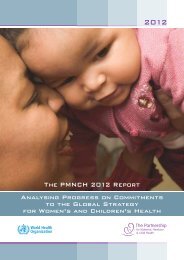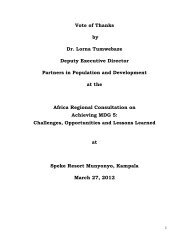State of World Population 2012 - UNFPA Haiti
State of World Population 2012 - UNFPA Haiti
State of World Population 2012 - UNFPA Haiti
You also want an ePaper? Increase the reach of your titles
YUMPU automatically turns print PDFs into web optimized ePapers that Google loves.
Cultural attitudes and expectations regardingvirginity, marriage and family roles remain rigidin many places, reinforced by anxieties aboutfemale sexuality, power and independence andthe very real dangers girls may face (Greeneand Merrick, n.d.). As more girls stay in schoolfor longer, they are statistically more likely tomature sexually while they are enrolled; theyface risks that few schools address adequately,including sexual violence, exposure to sexuallytransmitted infections and HIV, early pregnancyand childbearing, and unsafe abortion (Lloyd2009). Of course not all <strong>of</strong> these risks are new,or occur just at school; out-<strong>of</strong>-school girls alsomarry, and continue to have children as teens ingreat number. What is new is the greater possibility<strong>of</strong> friction between the parts <strong>of</strong> girls’ rolesthat remain stable (domestic chores, expectationsabout virginity, the management <strong>of</strong> theirsexuality, and aspirations for marriage) and thosethat are changing (schooling, exposure to peers,greater mobility in some cases).Unsafe abortion is “a procedure for terminating anunintended pregnancy that is carried out either by a personlacking the necessary skills or in an environment that doesnot conform to the minimal medical standards, or both.”— <strong>World</strong> Health Organization (1992).An analysis in five African countries <strong>of</strong> theexperience <strong>of</strong> 12-to-19 year-olds who were inschool at age 12 shows that girls are less likelythan boys at every age to continue in primaryor secondary school, and less likely than boysto make the transition from primary to secondaryschool (Biddlecom et al., 2008). Girls aremuch more vulnerable to dropping out oncethey are sexually mature and once they experiencepremarital sex; early pregnancy is evenmore disastrous for girls. Some recent researchsuggests that pregnancy and early marriage aremore likely consequences rather than causes<strong>of</strong> girls failing to complete their secondaryeducation (Biddlecom et al., 2008; Lloyd andMensch, 2008).Redefining what it means to be a“real man”Like women and girls, men and boys feel socialpressures to adopt rigid ideals about how theyshould behave, feel, and interact to be consideredreal men. These ideals are learned, nota result <strong>of</strong> simply their sex (Connell, 1987;Connell, 1998). When given the opportunity tocritically reflect on these ideals, men and boyscan <strong>of</strong>ten describe the pressures they feel to bereal men—a term usually ascribed to takingrisks, enduring pain, being tough, being aprovider, and having multiple sex partners(Flood, 2007).Real men usually refers to hegemonic masculinity—theprevailing measure <strong>of</strong> masculinityby which men assess themselves and others.Dominant concepts <strong>of</strong> masculinity are complexand different across societies, influenced by severalfactors including culture, race, social class,and sexuality (Kimmel, 2000). For example, agroup with one version <strong>of</strong> masculinity withina social class or ethnic group may exert greaterpower over another, just as heterosexual masculinityis <strong>of</strong>ten dominant over homosexualand bisexual masculinity (Marsiglio, 1998). Inmany societies, hegemonic masculinity is associatedwith heterosexuality, marriage, authority,pr<strong>of</strong>essional success, ethnic dominance, and/or physical toughness (Barker, Ricardo andNascimento, 2007).Men and boys who deviate from dominantmale norms in their attitudes and behaviours aresusceptible to ridicule and criticism (Barker and44 CHAPTER 3: CHALLENGES IN EXTENDING ACCESS TO EVERYONE
















